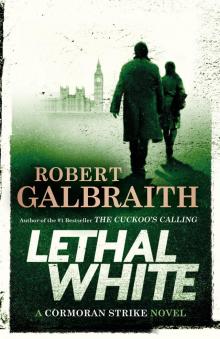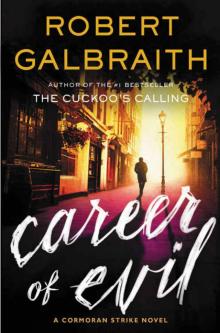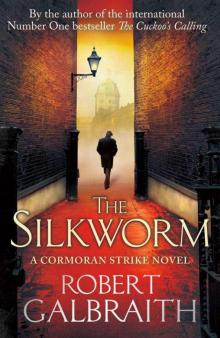- Home
- Robert Galbraith
Career of Evil Page 6
Career of Evil Read online
Page 6
“I can ’ave an ask around.”
“Usual rates,” said Strike, who had a standing arrangement with Shanker for useful bits of information. “And—Shanker?”
His old friend had a habit of hanging up without warning when his attention was diverted.
“’S’there more?” said Shanker, his voice moving from distant to close as he spoke; Strike had been right to think he had removed the mobile from his ear, assuming they were done.
“Yeah,” said Strike. “Digger Malley.”
A silence on the end of the line eloquently expressed the fact that, just as Strike never forgot what Shanker was, nor did Shanker ever forget what Strike was.
“Shanker, this is between you and me, no one else. You’ve never discussed me with Malley, have you?”
After a pause, and in his most dangerous voice, Shanker said:
“The fuck would I do that for?”
“Had to ask. I’ll explain when I see you.”
The dangerous silence continued.
“Shanker, when have I ever grassed you up?” asked Strike.
Another, shorter silence, and then Shanker said in what, to Strike, was his normal voice:
“Yeah, all right. Whittaker, huh? See what I can do, Bunsen.”
The line went dead. Shanker did not do good-byes.
Strike sighed and lit up another cigarette. The journey had been pointless. He would get straight back on a train once he had finished his Benson & Hedges.
The station entrance gave onto a kind of concrete forecourt surrounded by the backs of buildings. The Gherkin, that giant black bullet of a building, glinted on the distant horizon. It had not been there twenty years previously, during Strike’s family’s brief sojourn in Whitechapel.
Looking around, Strike felt no sense of homecoming or nostalgia. He could not remember this patch of concrete, these nondescript rears of buildings. Even the station seemed only dimly familiar. The endless series of moves and upheavals that had characterized life with his mother had blurred memories of individual places; he sometimes forgot which corner shop had belonged to which rundown flat, which local pub had adjoined which squat.
He had meant to get back on the Tube and yet before he knew it, he was walking, heading for the one place in London he had avoided for seventeen years: the building where his mother had died. It had been the last of Leda’s squats, two floors of a decrepit building on Fulbourne Street, which was barely a minute from the station. As he walked, Strike began to remember. Of course: he had walked over this metal bridge over the railway line during his A-level year. He remembered the name, Castlemain Street, too… surely one of his fellow A-level students, a girl with a pronounced lisp, had lived there…
He slowed to an amble as he reached the end of Fulbourne Street, experiencing a strange double impression. His vague memory of the place, weakened no doubt by his deliberate attempts to forget, lay like a faded transparency over the scene in front of his eyes. The buildings were as shabby as he remembered them, white plaster peeling away from the frontages, but the businesses and shops were totally unfamiliar. He felt as though he had returned to a dreamscape where the scene had shifted and mutated. Of course, everything was impermanent in the poor areas of London, where fragile, fair-weather businesses grew up and faded away and were replaced: cheap signage tacked up and removed; people passing through, passing away.
It took him a minute or two to identify the door of what had once been the squat, because he had forgotten the number. At last he found it, beside a shop selling cheap clothing of both Asian and Western varieties, which he thought had been a West Indian supermarket in his day. The brass letter box brought back a strange stab of memory. It had rattled loudly whenever anyone went in or out of the door.
Fuck, fuck, fuck…
Lighting a second cigarette from the tip of the first, he walked briskly out onto Whitechapel Road, where market stalls stood: more cheap clothing, a multitude of gaudy plastic goods. Strike sped up, walking he was not sure where, and some of what he passed triggered more memories: that snooker hall had been there seventeen years ago… so had the Bell Foundry… and now the memories were rising to bite him as though he had trodden on a nest of sleeping snakes…
As she neared forty, his mother had begun to go for younger men, but Whittaker had been the youngest of the lot: twenty-one when she had started sleeping with him. Her son had been sixteen when she first brought Whittaker home. The musician had looked ravaged even then, with sallow hollows under his wide-apart eyes, which were a striking golden hazel. His dark hair fell in dreadlocks to his shoulders; he lived in the same T-shirt and jeans and consequently stank.
A well-worn phrase kept echoing in Strike’s head, keeping pace with his footsteps as he trudged down Whitechapel Road.
Hiding in plain sight. Hiding in plain sight.
Of course people would think he was obsessed, biased, unable to let go. They would say his thoughts had jumped to Whittaker when he saw the leg in the box because he had never got over the fact that Whittaker had walked free on the charge of killing Strike’s mother. Even if Strike explained his reasons for suspecting Whittaker, they would probably laugh at the notion that such an ostentatious lover of the perverse and the sadistic could have cut off a woman’s leg. Strike knew how deeply ingrained was the belief that the evil conceal their dangerous predilections for violence and domination. When they wear them like bangles for all to see, the gullible populace laughs, calls it a pose, or finds it strangely attractive.
Leda had met Whittaker at the record company where she worked as a receptionist, a minor, living piece of rock history employed as a kind of totem on the front desk. Whittaker, who played the guitar and wrote lyrics for a succession of thrash metal bands that, one by one, threw him out because of his histrionics, substance abuse and aggression, claimed to have met Leda while pursuing a record deal. However, Leda had confided to Strike that their first encounter had happened while she was trying to persuade security not to be so rough with the young man they were throwing out. She had brought him home, and Whittaker had never left.
The sixteen-year-old Strike had not been sure whether or not Whittaker’s gloating, open pleasure in everything that was sadistic and demonic was genuine or a pose. All he had known was that he hated Whittaker with a visceral loathing that had transcended anything he had felt for any of the other lovers whom Leda had taken up, then left behind. He had been forced to breathe in the man’s stench as he did his homework of an evening in the squat; he had almost been able to taste him. Whittaker tried patronizing the teenager—sudden explosions and waspish put-downs revealed an articulacy he was careful to hide when he wished to ingratiate himself with Leda’s less educated friends—but Strike had been ready with put-downs and comebacks of his own and he had the advantage of being less stoned than Whittaker, or, at least, only as stoned as a person could be living in a constant fug of cannabis smoke. Out of Leda’s hearing, Whittaker had jeered at Strike’s determination to continue his oft-disrupted education. Whittaker was tall and wiry, surprisingly well muscled for one who lived an almost entirely sedentary life; Strike was already over six feet and boxing at a local club. The tension between the two stiffened the smoky air whenever both were present, the threat of violence constant.
Whittaker had driven Strike’s half-sister Lucy away for good with his bullying, his sexual taunts and sneers. He had strutted around the squat naked, scratching his tattooed torso, laughing at the fourteen-year-old girl’s mortification. One night she had run to the telephone box at the corner of the street and begged their aunt and uncle in Cornwall to come and fetch her. They had arrived at the squat at dawn next day, having driven overnight from St. Mawes. Lucy was ready with her meager possessions in a small suitcase. She had never lived with her mother again.
Ted and Joan had stood on the doorstep and pleaded with Strike to come too. He had refused, his resolve hardening with every plea Joan made, determined to sit Whittaker out, not to leave him alone with hi
s mother. By now, he had heard Whittaker talking lucidly about what it would feel like to take a life, as though it were an epicurean treat. He had not believed, then, that Whittaker meant it, but he had known him capable of violence, and had seen him threaten their fellow squatters. Once—Leda refused to believe it had happened—Strike had witnessed Whittaker attempt to bludgeon a cat that had inadvertently woken him from a doze. Strike had wrested the heavy boot from Whittaker’s hand as he chased the terrified cat around the room, swinging at it, screaming and swearing, determined to make the animal pay.
The knee onto which the prosthesis was fitted was beginning to complain as Strike strode faster and faster along the street. The Nag’s Head pub rose up on the right as though he had conjured it, squat, square and brick. Only at the door did he catch sight of the dark-clad bouncer and remember that the Nag’s Head was another lap-dancing club these days.
“Bollocks,” he muttered.
He had no objection to semiclad women gyrating around him while he enjoyed a pint, but he could not justify the exorbitant price of drinks in such an establishment, not when he had lost two clients in a single day.
He therefore entered the next Starbucks he encountered, found a seat and heaved his sore leg onto an empty chair while he moodily stirred a large black coffee. The squashy earth-colored sofas, the tall cups of American froth, the wholesome young people working with quiet efficiency behind a clean glass counter: these, surely, were the perfect antidote to Whittaker’s stinking specter, and yet he would not be driven out. Strike found himself unable to stop reliving it all, remembering…
While he had lived with Leda and her son, Whittaker’s teenage history of delinquency and violence had been known only to social services in the north of England. The tales he told about his past were legion, highly colored and often contradictory. Only after he had been arrested for murder had the truth leaked out from people from his past who surfaced, some hoping for money from the press, some determined to revenge themselves on him, others trying in their own muddled fashion to defend him.
He had been born into a moneyed upper-middle-class family headed by a knighted diplomat whom Whittaker had believed, until the age of twelve, was his father. At that point he had discovered that his older sister, whom he had been led to believe was in London working as a Montessori teacher, was actually his mother, that she had serious alcohol and drug problems and that she was living in poverty and squalor, ostracized by her family. From this time onward, Whittaker, already a problem child prone to outbursts of extreme temper during which he lashed out indiscriminately, had become determinedly wild. Expelled from his boarding school, he had joined a local gang and soon became ringleader, a phase that culminated in a spell in a correctional facility because he had held a blade to a young girl’s throat while his friends sexually assaulted her. Aged fifteen, he had run away to London, leaving a trail of petty crime in his wake and finally succeeding in tracking down his biological mother. A brief, enthusiastic reunion had deteriorated almost at once into mutual violence and animosity.
“Is anyone using this?”
A tall youth had bent over Strike, his hands already gripping the back of the chair on which Strike’s leg was resting. He reminded Strike of Robin’s fiancé Matthew, with his wavy brown hair and clean-cut good looks. With a grunt, Strike removed his leg, shook his head and watched the guy walk away carrying the chair, rejoining a group of six or more. The girls there were eager for his return, Strike could see: they straightened up and beamed as he placed the chair down and joined them. Whether because of the resemblance to Matthew, or because he had taken Strike’s chair, or because Strike genuinely sensed a tosser when he saw one, Strike found the youth obscurely objectionable.
His coffee unfinished but resentful that he had been disturbed, Strike heaved himself back to his feet and left. Spots of rain hit him as he walked back along Whitechapel Road, smoking again and no longer bothering to resist the tidal wave of memory now carrying him along…
Whittaker had had an almost pathological need for attention. He resented Leda’s focus being diverted from him at any time and for any reason—her job, her children, her friends—and he would turn his flashes of mesmeric charm on other women whenever he deemed her inattentive. Even Strike, who hated him like a disease, had to acknowledge that Whittaker possessed a powerful sex appeal which worked on nearly every woman who passed through the squat.
Thrown out of his most recent band, Whittaker continued to dream of stardom. He knew three guitar chords and covered every bit of paper not hidden from him with lyrics that drew heavily on the Satanic Bible, which Strike remembered lying, its black cover emblazoned with a pentagram and goat-head combined, on the mattress where Leda and Whittaker slept. Whittaker had an extensive knowledge of the life and career of the American cult leader Charles Manson. The scratchy sound of an old vinyl copy of Manson’s album LIE: The Love and Terror Cult formed the soundtrack to Strike’s GCSE year.
Whittaker had been familiar with Leda’s legend when he met her, and liked to hear about the parties she had been at, the men she had slept with. Through her, he became connected to the famous, and as Strike got to know him better he came to conclude that Whittaker craved celebrity above almost anything else. He made no moral distinction between his beloved Manson and the likes of Jonny Rokeby, rock star. Both had fixed themselves permanently in the popular consciousness. If anything, Manson had achieved it more successfully, because his myth would not fluctuate with fashion: evil was always fascinating.
However, Leda’s fame was not all that attracted Whittaker. His lover had borne children to two wealthy rock stars who provided child support. Whittaker had entered the squat under the clear impression that it was part of Leda’s style to dwell in impoverished bohemia, but that somewhere nearby was a vast pool of money into which Strike and Lucy’s fathers—Jonny Rokeby and Rick Fantoni respectively—were pouring money. He did not seem to understand or believe the truth: that years of Leda’s financial mismanagement and profligacy had led both men to tie up the money in such a way that Leda could not fritter it away. Gradually, over the months, Whittaker’s spiteful asides and jibes on the subject of Leda’s reluctance to spend money on him had become more frequent. There were grotesque tantrums when Leda would not fork out for the Fender Stratocaster on which he had set his heart, would not buy him the Jean Paul Gaultier velvet jacket for which, stinking and shabby though he was, he suddenly had a yen.
He increased the pressure, telling outrageous and easily disprovable lies: that he needed urgent medical treatment, that he was ten thousand pounds in debt to a man threatening to break his legs. Leda was alternately amused and upset.
“Darling, I haven’t got any dough,” she would say. “Really, darling, I haven’t, or I’d give you some, wouldn’t I?”
Leda had fallen pregnant in Strike’s eighteenth year, while he was applying for university. He had been horrified, but even then he had not expected her to marry Whittaker. She had always told her son that she had hated being a wife. Her first teenage essay into matrimony had lasted two weeks before she had fled. Nor did marriage seem at all Whittaker’s style.
Yet it had happened, undoubtedly because Whittaker thought it would be the only sure way to get his hands on those mysteriously hidden millions. The ceremony took place at the Marylebone registry office, where two Beatles had previously married. Perhaps Whittaker had imagined that he would be photographed in the doorway like Paul McCartney, but nobody had been interested. It would take the death of his beaming bride to bring the photographers swarming to the court steps.
Strike suddenly realized that he had walked all the way to Aldgate East station without meaning to. This whole trip, he castigated himself, had been a pointless detour. If he had got back on the train at Whitechapel he would have been well on the way to Nick and Ilsa’s by now. Instead, he had careered off as fast as he could in the wrong direction, timing his arrival perfectly to hit the rush-hour crush on the Tube.
His
size, to which was added the offense of a backpack, caused unexpressed disgruntlement in those commuters forced to share the space with him, but Strike barely noticed. A head taller than anyone near him, he held on to a hand strap and watched his swaying reflection in the darkened windows, remembering the last part, the worst part: Whittaker in court, arguing for his liberty, because the police had spotted anomalies in his story of where he had been on the day that the needle entered his wife’s arm, inconsistencies in his account of where the heroin had come from and what Leda’s history of drug use had been.
A raggle-taggle procession of fellow squat-dwellers had given evidence about Leda and Whittaker’s turbulent, violent relationship, about Leda’s eschewal of heroin in all its forms, about Whittaker’s threats, his infidelities, his talk of murder and of money, his lack of noticeable grief after Leda’s body had been found. They had insisted over and again, with unwise hysteria, that they were sure Whittaker had killed her. The defense found them pathetically easy to discredit.
An Oxford student in the dock had come as a refreshing change. The judge had eyed Strike with approval: he was clean, articulate and intelligent, however large and intimidating he might be if not suited and tied. The prosecution had wanted him there to answer questions on Whittaker’s preoccupation with Leda’s wealth. Strike told the silent court about his stepfather’s previous attempts to get his hands on a fortune that existed largely in Whittaker’s own head, and about his increasing pleas to Leda for her to put him in her will as proof of her love for him.
Whittaker watched out of his gold eyes, almost entirely impassive. In the last minute of his evidence, Strike and Whittaker’s eyes had met across the room. The corner of Whittaker’s mouth had lifted in a faint, derisive smile. He had raised his index finger half an inch from the place where it rested on the bench in front of him and made a tiny sideways swiping motion.

 Lethal White
Lethal White The Cuckoo's Calling
The Cuckoo's Calling Career of Evil
Career of Evil The Silkworm
The Silkworm